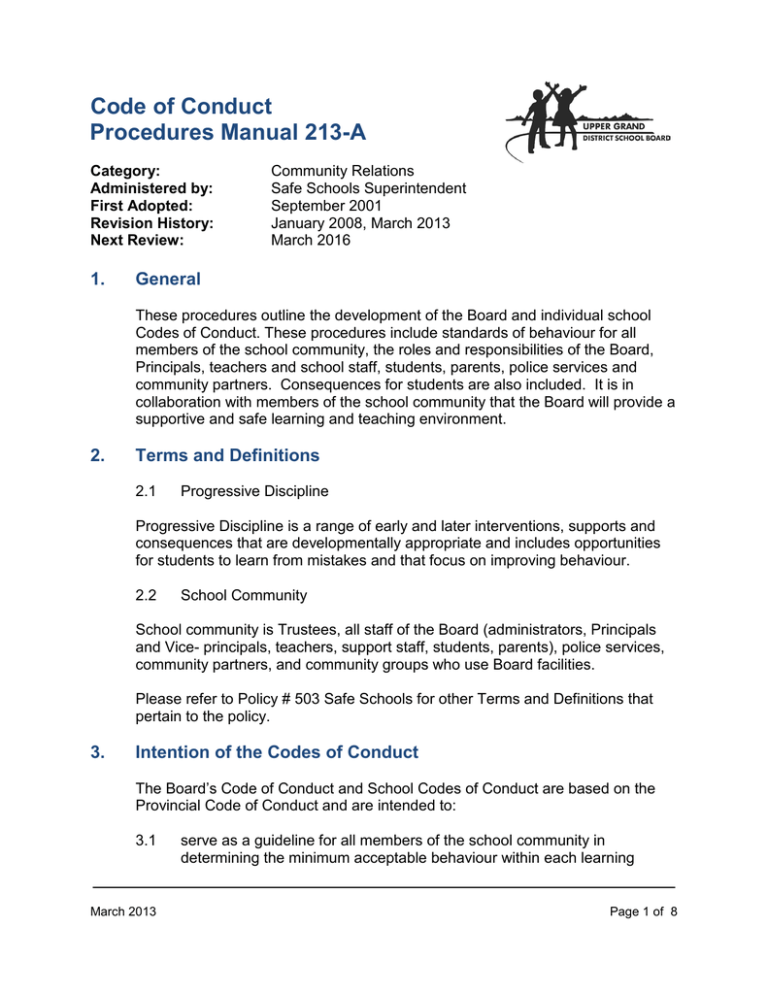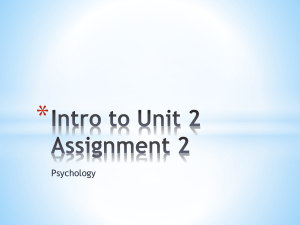Code of Conduct Procedures Manual 213-A 1.
advertisement

Code of Conduct Procedures Manual 213-A Category: Administered by: First Adopted: Revision History: Next Review: 1. Community Relations Safe Schools Superintendent September 2001 January 2008, March 2013 March 2016 General These procedures outline the development of the Board and individual school Codes of Conduct. These procedures include standards of behaviour for all members of the school community, the roles and responsibilities of the Board, Principals, teachers and school staff, students, parents, police services and community partners. Consequences for students are also included. It is in collaboration with members of the school community that the Board will provide a supportive and safe learning and teaching environment. 2. Terms and Definitions 2.1 Progressive Discipline Progressive Discipline is a range of early and later interventions, supports and consequences that are developmentally appropriate and includes opportunities for students to learn from mistakes and that focus on improving behaviour. 2.2 School Community School community is Trustees, all staff of the Board (administrators, Principals and Vice- principals, teachers, support staff, students, parents), police services, community partners, and community groups who use Board facilities. Please refer to Policy # 503 Safe Schools for other Terms and Definitions that pertain to the policy. 3. Intention of the Codes of Conduct The Board’s Code of Conduct and School Codes of Conduct are based on the Provincial Code of Conduct and are intended to: 3.1 March 2013 serve as a guideline for all members of the school community in determining the minimum acceptable behaviour within each learning Page 1 of 8 Policy 213 CODE OF CONDUCT environment: on school and Board property, school buses, and at school and school and/or Board-related events and activities on or off site, and in other circumstances that could have a negative impact on the school climate 4. 3.2 ensure that all members of the school community are treated with respect and dignity, especially persons in positions of authority 3.3 promote responsible citizenship by encouraging appropriate participation in the civic life of the school community 3.4 maintain an environment where conflict and difference can be addressed in a manner characterized by respect and civility 3.5 encourage the use of non-violent means to resolve conflict 3.6 promote the safety of people in the schools 3.7 discourage the use of alcohol and illegal drugs 3.8 prevent bullying in the schools. Standards of Behaviour 4.1 Respect, Civility and Responsible Citizenship All members of the school community will: March 2013 4.1.1 respect and comply with all applicable Federal, Provincial and Municipal laws 4.1.2 demonstrate honesty and integrity 4.1.3 respect differences in people, their ideas and opinions 4.1.4 treat one another with dignity and respect at all times, and especially where there is disagreement 4.1.5 respect and treat others fairly, regardless of their race, ancestry, place of origin, colour, ethnic origin, citizenship, religion, gender, sexual orientation, age or disability 4.1.6 respect the rights of others Page 2 of 8 Policy 213 CODE OF CONDUCT 4.1.7 show proper care and regard for school property and the property of others 4.1.8 take appropriate measures to help those in need 4.1.9 seek school staff assistance, if necessary, to resolve conflict peacefully 4.1.10 respect all members of the school community, especially persons who are in a position of authority 4.1.11 respect the needs of others to work in an environment that is conducive to learning and teaching 4.1.12 not swear at a teacher or at another person in authority. 4.2 Safety All members of the school community will not: 4.2.1 engage in bullying behaviours including cyber-bullying 4.2.2 commit sexual assault 4.2.3 traffic in weapons or illegal drugs 4.2.4 give alcohol to a minor 4.2.5 commit robbery 4.2.6 be in possession of any weapon including, but not limited to firearms 4.2.7 use any object to threaten or intimidate another person 4.2.8 cause injury to any person with an object 4.2.9 be in possession of, or under the influence of, or provide others with alcohol or illegal drugs 4.2.10 inflict or encourage others to inflict bodily harm on another person 4.2.11 engage in hate propaganda and other forms of behaviour motivated by bias, prejudice, and hate March 2013 Page 3 of 8 Policy 213 CODE OF CONDUCT 4.2.12 commit an act of vandalism that causes extensive damage to school property or property located on the premises of a school 4.2.13 engage in any form of electronic communication directed to an individual or group of people that is intended to cause or should be known to cause fear, distress and/or harm to other persons’ feelings, self esteem, or reputation, or that has a negative impact on the school climate. 5. Roles and Responsibilities of the Board The Board will: 6. 5.1 cooperate fully with police and community agencies in the administration of this policy 5.2 seek input on the Board’s Code of Conduct from the Safe, Equitable and Inclusive Schools Steering Committee, which includes representation from the Parent Involvement Committee (PIC) and the Special Education Advisory Committee (SEAC). 5.3 communicate the Provincial Code of Conduct and the Board’s Code of Conduct to parents, students, Principals, teachers, school and Board staff, and all members of the school community, and obtain their commitment and support 5.4 develop effective intervention strategies and to respond to all infractions related to the standards for respect, civility, responsible citizenship and safety 5.5 provide opportunities for staff to acquire the knowledge, skills and attributes necessary to develop and maintain academic excellence to promote a safe learning and teaching environment. Roles and Responsibilities of Principals Principals will: 6.1 take a leadership role in the daily operation of the school by demonstrating care and commitment to academic excellence and a safe, inclusive and accepting teaching and learning environment 6.2 hold those under their authority accountable for their actions and behaviour March 2013 Page 4 of 8 Policy 213 CODE OF CONDUCT 7. 6.3 empower students to be positive leaders in their school and community 6.4 communicate meaningfully and on a regular basis with all members of the school’s community 6.5 ensure that a School Code of Conduct, based on the Ontario Code of Conduct and Board’s Code of Conduct, is developed and communicated annually to the school community 6.6 review the School Code of Conduct at least once every three years, and to seek input from school councils, staff, students, parents and guardians, and the school community on the review. Roles and Responsibilities of Teachers and School Staff Teachers and school staff will: 8. 7.1 serve as role models 7.2 maintain order in the school 7.3 maintain consistent standards of behaviour for all students 7.4 help students work to fulfill their potential, develop self-worth, and prepare them for the full responsibilities of citizenship 7.5 communicate regularly and meaningfully with parents/guardians 7.6 demonstrate respect for all students, staff, parents, volunteers, and the members of the school community 7.7 empower students to be positive leaders in their school and community. Roles and Responsibilities of Students Students will be treated with respect and dignity by all school and Board staff, and will: 8.1 follow the established rules and accept responsibility for their personal actions 8.2 demonstrate respect for self and others, for those in authority and for responsible citizenship through acceptable behaviour March 2013 Page 5 of 8 Policy 213 CODE OF CONDUCT 9. 8.3 fulfill expected academic obligations 8.4 come to school punctually each day, prepared and willing to learn 8.5 obey the rules of the school, on school buses, and at other sites during school activities 8.6 refrain from bringing anything to school that compromises the safety of others 8.7 dress appropriately in accordance with the Board’s and the school’s policies 8.8 use respectful language, free from profanity 8.9 work cooperatively with staff and other students 8.10 be honest in their academic work (refrain from plagiarism, cheating, etc.) 8.11 use free time responsibly. Roles and Responsibilities of Parents Parents play an important role in the education of their children and will: 9.1 demonstrate respect for all members of the school community 9.2 support the efforts of school staff in maintaining a safe and respectful learning environment 9.3 show an active interest in their child’s work and progress 9.4 communicate regularly with their child’s school 9.5 assist staff in dealing with disciplinary issues that involve their child 9.6 help their child be neat, dress appropriately, be well-rested and prepared and ready to learn 9.7 ensure that their child attends school regularly and on time 9.8 promptly report their child’s absence or late arrival March 2013 Page 6 of 8 Policy 213 CODE OF CONDUCT 10. 9.9 show that they are familiar with the Ontario and Board Codes of Conduct and the school’s Code of Conduct and rules of behaviour 9.10 help and encourage their child in following the Board and the School Codes of Conduct and the school’s rules of behaviour. Roles and Responsibilities of Police Services Police are partners with schools and school boards in maintaining safe schools and communities. Through the guidelines established in the Police/School Board Protocol, Police support schools by encouraging, enabling and maintaining positive relationships with school administrators, staff, students, parents, and members of the school community. 11. Roles and Responsibilities of Community Partners Community partners, service agencies and members of the community are resources that can help schools deliver prevention and intervention programs. Current and new partnerships, protocols and outreach are encouraged and supported by the Board to formalize and enhance relationships to maintain safe schools and communities. 12. School Codes of Conduct School Codes of Conduct will: 12.1 be based on, but not limited to, the minimum expectations for behaviour as outlined in this policy, and the Ontario Code of Conduct 12.2 include responsibilities for students, staff, parents, visitors, volunteers and other members of the school community 12.3 be developed and communicated annually to the school community 12.4 be reviewed every three years 12.5 reflect the Ontario Code of Conduct, the Board’s Code of Conduct and Board policies 12.6 set out clearly what is acceptable and what is unacceptable behaviour 12.7 ensure that the school environment is conducive to learning, allowing the effective and uninterrupted instruction of all students March 2013 Page 7 of 8 Policy 213 CODE OF CONDUCT 13. 12.8 help students understand the expectations for all citizens, including those of their age and developmental stage 12.9 outline a progressive approach to discipline and establish prevention and intervention strategies that set out fair enforcement of rules, and the administration of appropriate consequences, including suspension and expulsion, as appropriate, consistent with the Education Act, and Board Policy # 503 Safe Schools (Student Discipline (Progressive Discipline, Suspension and Expulsion). Consequences for Students In addressing inappropriate behaviour by students schools will: 13.1 utilize a progressive discipline approach 13.2 utilize Student Success and Character Development strategies and programs 13.3 provide students with the opportunity to learn life skills such as conflict resolution, anger management and communication skills 13.4 utilize models such as those based on the concepts of peer mediation and/or peer counseling 13.5 document incidents requiring disciplinary measures, and apply the mitigating factors to be sensitive to unique circumstances which may affect student behaviour 13.6 ensure that contact with the parents and guardians of students under the age of eighteen, or students over the age of 18 or those 16 or 17 years old who have withdrawn from parental control (adult students), is made early in the disciplinary process and involves them in a plan to improve the student’s behaviour until the behaviour is acceptable 13.7 utilize consequences such as short-term suspension as a useful tool, and respond as required with long-term suspension or expulsion. The Board’s Policy # 503 Student Discipline (Bullying Prevention and Intervention, Progressive Discipline, Suspension, Expulsion) sets out the process for suspension and expulsion of students, including mitigating factors that must be considered. March 2013 Page 8 of 8


